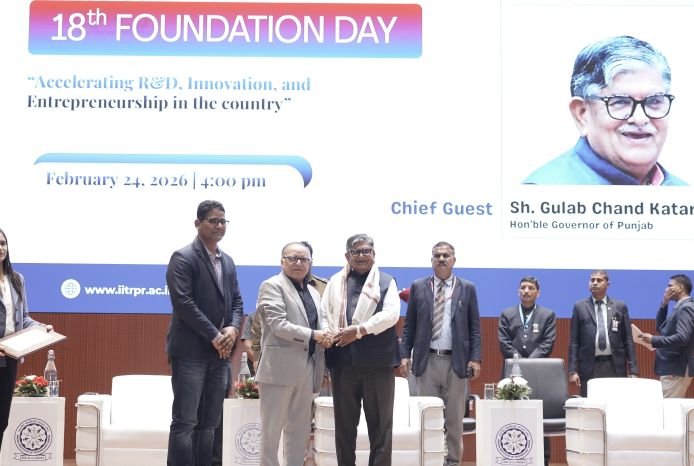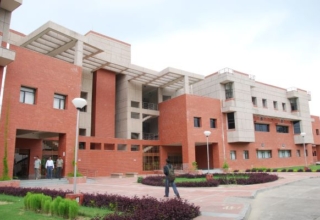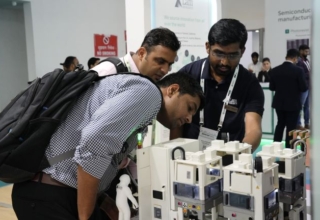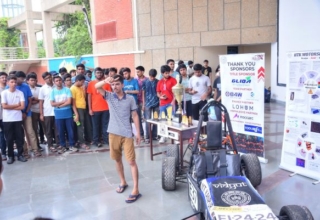
Under the leadership and guidance of Dr Mylswamy Annadurai, former Director of Indian Space Research Organization’s Satellite Centre and popularly called as the Moon Man of India, and in collaboration with UAE-based Edutech4Space, a pioneer in the field of space technology education, BITS Pilani Dubai Campus (BPDC), recently launched and tested 5 Pico Satellites using Drone Satellite Launch Vehicle (DSLV) at Sanad Academy, Dubai. This effort marks a significant first step towards Project MAHASAT.
A team of 30 undergraduate students from BPDC studying in diverse streams such as Electronics Engineering, Mechanical Engineering, Computer Science, Biotechnology etc came together and managed to launch the Pico Satellites within 6 weeks of the announcement of Project MAHASAT. Students were thrilled as the Pico Satellites started transmitting real time data of temperature, humidity, pressure, air quality, UV intensity, and orientation. The data were projected on a large smart board for the visitors, giving them the ambience of a mission control centre.
Present at the launch were Dr. Eesa Al Bastaki, President of the University of Dubai, Dr. Srinivasan Madapusi, Director of BPDC, faculty members and students of BPDC.
Speaking at the launch Dr. Madapusi said, “Pico Satellites are the future of space exploration, and they’re already making waves in the classrooms across the world. While their low cost and relatively quick turnaround time makes them invaluable from an education perspective, they also have the power to engage students in a project from its initial paper design to building and testing to launch. Further, this is an excellent training ground for developing interdisciplinary skills and systems level thinking that are critical for the future. Through this hands-on experience in development, management, and mission training, BPDC is giving next-generation scientists a chance to learn valuable skills that will forge UAE’s plans to become the regional hub for commercial space activities and advanced research and development”.
Shrisudha Viswanathan, Founder & CEO of Edutech4Space, said, “We had an intensive training with upcoming engineers & future scientists of BPDC from the time we started the project MAHASAT. Using Drone Satellite Launch Vehicle (DSLV) to carry the 5 Pico Satellites to an altitude of 100 meters is a unique attempt in GCC. With this success we are now geared to move for Phase 2 which is, ground station installation at BPDC before we finally build the Engineering model and flight model of cubesat.”
Echoing the excitement of the team, Samarth Kalpesh Kumar Brahmbhatt, 2nd Year Electronics student of BPDC said, “Being a part of this team has been a whole new and an amazing opportunity of learning. Creating the processor of this satellite was my favorite part and made me feel like I am a space scientist. We are grateful for being given an opportunity to participate in this; it has been an amazing experience so far. I am truly thankful to BPDC and Edutech4Space.”
Another team member, Hansa Kannan, 1st year Biotech Engineering student of BPDC said “During the span of six weeks, I have been immersed in a realm of science that has completely transformed my perspective. It has been an incredible journey, and I am truly grateful to BPDC for igniting my passion and providing me with invaluable guidance to pursue my aspirations and dreams.”
Dr Annadurai who is overseeing the Project MAHASAT and guiding BPDC students said, “With the emergence of advancements in space technology, availability of trained manpower is going to be crucial. A very concrete academic plan has been devised wherein students of BPDC will be trained to make significant contributions in the field of Space technology of UAE and India. The university will also have its own Ground Station in near future which will enable students to communicate with their satellites, collect data, analyse it, and create predictions on weather, pollution levels, disaster management etc.”








